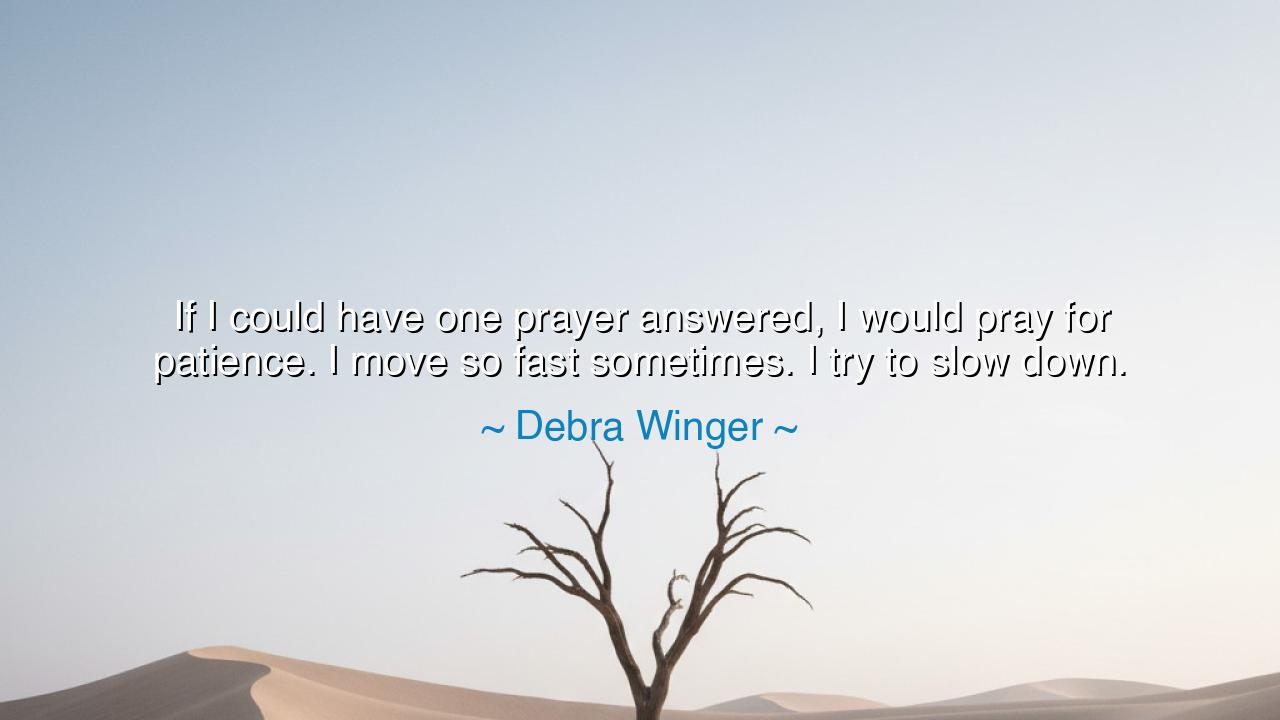
If I could have one prayer answered, I would pray for patience.
If I could have one prayer answered, I would pray for patience. I move so fast sometimes. I try to slow down.






Hear, O children of wisdom, the heartfelt words of Debra Winger: “If I could have one prayer answered, I would pray for patience. I move so fast sometimes. I try to slow down.” In this confession shines the struggle of the human soul in every age—the tension between swiftness and stillness, between the rush of life and the peace of waiting. For we live in a world that calls us ever forward, urging us to act, to achieve, to conquer. Yet the soul whispers that without patience, all speed becomes frenzy, and the fruits of life are passed by, un savored.
From the earliest days, men have sought the virtue of patience as the rarest treasure. The farmer who casts seed must learn to wait for the rains. The sailor must hold his course when the winds fall silent. The mother must endure sleepless nights, knowing the child will grow only with time. Winger’s words echo this ancient truth: that the greatest struggles are not always against others, but against the restless storm within. To move so fast is to risk leaving behind the very meaning of life. To pray for patience is to pray for balance, for stillness of spirit amidst the rush of days.
Consider, O listeners, the tale of Mahatma Gandhi. Though the weight of empire pressed upon his people, though many cried out for violent haste, he chose the slow and steady path of nonviolence. He marched, he fasted, he endured long years of trial. The world mocked his slowness, yet his patience conquered an empire greater than armies could. His life is proof that to slow down is not weakness, but strength—that enduring steadily may accomplish what rushing cannot.
Winger’s confession also speaks to the nature of art itself. In the prayer of every artist lies the desire not only to create, but to dwell within the process. Yet the impatient soul seeks completion, fame, or recognition too quickly. The greatest works, however, demand stillness: the writer rewriting a thousand times, the painter layering brushstrokes year after year, the composer laboring over each note. To slow down is to honor the craft, and to honor life itself. Without patience, even talent withers.
So too in the lives of ordinary men and women. How many chase after wealth, rushing from task to task, only to find themselves weary and empty? How many run so swiftly that they fail to notice the laughter of their children, the beauty of the sunset, the gentleness of a friend’s voice? Winger’s words are a warning, not only for herself, but for all who hasten: slow down, lest life’s treasures pass unseen. Patience is not merely waiting—it is seeing, hearing, living.
The meaning of her prayer is thus: patience is not given by the world; it must be sought as a holy gift. It is not merely the absence of speed, but the presence of peace. To ask for patience is to ask for mastery over the restless heart, to pray for the ability to abide in the present moment, to walk through time not as a slave to haste, but as a steward of meaning.
The lesson for you, O hearer, is this: seek patience as you would seek gold. Do not rush blindly through your days. Practice slowing yourself, even in small ways. Pause to breathe before you speak. Linger in silence before you act. Taste your food slowly, listen fully to others, walk without hurry. These small acts train the soul, so that when great trials come, your heart will not be overcome by frenzy, but will endure with strength.
Therefore, O children of tomorrow, let Debra Winger’s words echo in your spirit: “I would pray for patience.” For in patience lies wisdom, in patience lies peace, and in patience lies the power to savor the gift of life. Slow down, and you will see more clearly. Endure, and you will grow stronger. Live not as one always rushing, but as one who walks steadily, with eyes wide open to the beauty along the path.






AAdministratorAdministrator
Welcome, honored guests. Please leave a comment, we will respond soon